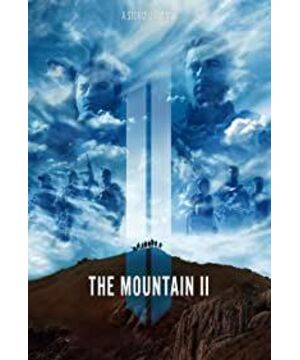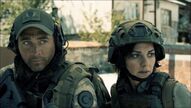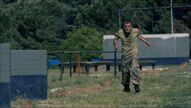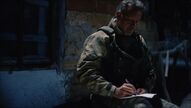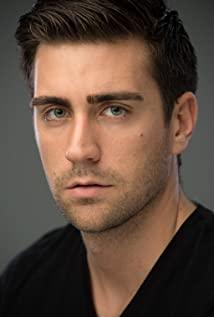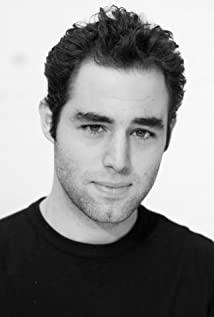They are not idiots, and the rhetoric of "for the country and the people" instantly becomes dust in the face of fear, like when people say work is for money, but work shapes them in turn: love, hate, greater desire to keep them going. Oguz's commander died in front of his eyes to save him. Since then, he has lost the joy of life and only feels pleasure in "fear and death". Bekir often wakes up in dreams, so they apply for special forces, right For these people, "serving the country and the people" is a nominal righteousness, and it has to be confirmed again and again (because the suspicion is always there), and their only motivation and concern during the battle are the teammates around them. They died, especially because of "I "And dying is no different from dying yourself. Chongshan, desert, border, seven special forces all the way to kill and save people. The emotional soundtrack made the audience frown, but fortunately the actors' performances and lines had enough weight to lock the frivolous feelings, so that every excitement fell into the heart, and the facial expressions were only silent - almost dumb, they The world is simplified to "Can you survive and let the brothers beside you live?" This sad and cruel inner world view forms a movie-watching atmosphere through expressions and silence, which is unbreakable and makes the viewer seem to be Infection, and finally unable to refute, so far it has formed a resonance, as if the audience also admitted and inexplicably felt such a world: sad and cruel. So also become silent, meditate, reflect on oneself - this is pessimism and its purifying effect. The so-called idealism is to let everyone live, and the realism is that some die and some survive. Both are true: the two forces are bound to live as little as possible each time. The former is the window of the world of ideas, and what is not available in phenomena—justice, immortality, and pure beauty—can be created in ideas; the latter is the last garrison of the world of phenomena, just like these seven soldiers: country, responsibility, Morality and relative value become the shackles they put on themselves. Phenomenon's position calls them sacrifices, but as Captain Veysel said "we are shadows and will be forgotten"; from a conceptual point of view, their shaping of themselves can be called aesthetic, but their sacrifices are completely a waste. Goethe said: "I will do all the evils in the world." If he had to choose, he would first choose to be a soldier.
The soundtrack of the film is still a bad point, too romantic. As mentioned above, fortunately, the actor's performance is in place, and there is no problem with the soundtrack. He is so excited and excited, just like "Wolf Warrior 2", like Wu Jingzhen It would be foolish to be proud of the belief in "the country and the people".
The spatial background of the story is well chosen, the borders of mountains and deserts, almost the projection of the phenomenon of its conceptual world, and the cruelty here extends the depth of its concepts again and again. In the long winding ravine covered by Bai Lian, a whole group of men, women and children who were killed by their hands were lying on their knees; a man and a woman were tied to two "X"-shaped torture posts in the empty basin, and the man was covered in blood and dying. Nailed in the shape of a cross, the woman was tied to her waist with ropes, blindfolded, and confined to a circular arc like a beast. The woman's tragic roar resounded in the empty valley, and a thug calmly sprinkled a pot of gasoline on her body. Hardy confided in "Tess": "The calling and the called seldom answer each other." This is a rare occasion. It was the director's goodwill arrangement that the woman was rescued by special forces. The man then asked Veysel to free him with bullets.
They retreated to the last stronghold with injuries, Veysel put down the wounded Boran, turned around and asked Bekir, who had withdrawn from the other way, "Esref?" At this moment, the camera first shows Afif, who is squatting against the wall with a gun in both hands. He has a blood-stained expression on half of his face, especially the look in his eyes from the boiling breath in his chest. You must guess that the one he just lost is his close relative. Then the camera turned back to Bekir, and the profile of his withered face disappeared in an instant, as if he had lost his brother, and then Veysel slowly turned around with a gun and gradually lost his mind. At the same time, as Veysel gradually turned the entire face to the camera from the side face, the picture gradually became clear from the hazy in this extremely short and long two seconds, and at this moment the picture turned to the shooting downward with anger. Oguz, this is the first time I've seen his expression in the whole film. His face is so sunny and handsome, and the big boy is so talented If there is resentment on his face, he can't tell how he feels in his heart; then back to Veysel, the camera covers his entire face inside, then you know the kind of sadness he shows when he arches his forehead. The expression of the pain of the child is something that a man would never let anyone see. It can be said that God stabbed him in the heart in person; the last shot shows Boran sitting on the side of the injured, and then it starts to blur, close to the camera. A wild grass gradually became clear in the field of vision, swaying in the wind in the wilderness: "The heaven and the earth are not benevolent, and all things are dogs."
This is already poetry.
I like the character of Arif, a sniper who protects his teammates from high places and kills. Every time he shoots, he recites poetry in his mouth. He must have a high-level awareness of himself and his team. He always retains a skeptical heart for all of this, Junyi's slightly shy smile and calm determination also shows that he is loyal to his team, and he may only care about them. He sang: "Why do poets have to work hard, because they want to seek inspiration for creation."
View more about The Mountain II reviews


